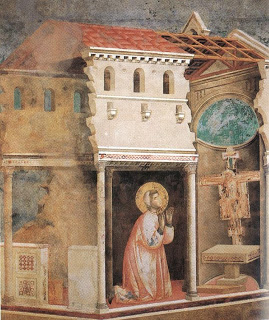In her recent post, Jana Bennett engaged an op/ed piece on the Wall Street Journal’s website that critiqued those, especially the bishops, who failed to recognize the Catholic dimension of Ryan’s budget proposal. Jana critiqued the authors for insinuating that the bishops should not engage politics, especially as it pertains to economic issues, and their failure to fully appreciate the role of the bishops and the state in economic affairs.
It was awkward moment when I read the original op/ed piece and realized that the authors, Antony Davies and Kristina Antolin, were both close friends of mine. I have had conversations with both Ant and Kristina on campus, at my local parish, over meals, and even at the pool where our kids were swimming.
As I know them and their perspective, I thought I should respond to Jana’s critique. My response is not primarily a defense of my friends (they are more than capable of defending themselves) but rather the ideas that they articulate. Actually, it is more a defense of the ideas they presuppose in making their argument.
As I understand it, there are two main presuppositions to Ant and Kristina’s argument. The first is that they are driven by a genuine concern for what helps the poor. Ant’s economic background and research have focused on what actually helps people. He has concluded, as most economist have, that private industries are better at helping create jobs and lifting people out of poverty and that political institutions tend to do this less effectively and efficiently. Ant does not believe that private industry solves everything perfectly but rather, if you genuinely want to help people, you should find out the best ways to do so. (In many ways it is a very Catholic perspective that reflects a trust in reason.)
This practical concern and the assumption that free markets address it well is part of Catholic social teaching. Quoting Centesimus Annus, the Compendium of the Social Doctrine of the Church states,
The free market is an institution of social importance because of its capacity to guarantee effective results in the production of goods and services. Historically, it has shown itself able to initiate and sustain economic development over long periods. There are good reasons to hold that, in many circumstances, “the free market is the most efficient instrument for utilizing resources and effectively responding to needs” (347).
Even the suspicion of the effectiveness of government in economic affairs is expressed in the Compendium.
In any case, public intervention must be carried out with equity, rationality and effectiveness, and without replacing the action of individuals, which would be contrary to their right to the free exercise of economic initiative. In such cases, the State becomes detrimental to society: a direct intervention that is too extensive ends up depriving citizens of responsibility and creates excessive growth in public agencies guided more by bureaucratic logic than by the goal of satisfying the needs of the person. (354)
As Jana correctly notes, Catholic social thought does affirm a legitimate role for government in the economic sphere. Yet, so often we seem too cavalier in assuming the state’s effectiveness in addressing poverty. We are readily (and rightfully) suspicious of government when it comes to war, but we seem to assume “the virtue of justice” when it comes to poverty. Megan Clark’s post on how governments tend to criminalize poverty should remind us of the need for some hermeneutics of suspicion when it comes to government efforts to relieve poverty.
The second presupposition of the argument is an anxiety over the coercive power of government, a claim that finds a ready home in recent moral theology that notes the monopoly the state has on violence (see, for example, Cavanaugh’s Myth of Religious Violence).
We in the United States have enjoyed such an absence of explicit religious persecution that we seem to forget the ways government can exert force to control people. We also tend to forget that the Church’s attempt to align itself too closely with government have proved to be bad for the church. Hence, the Declaration of Religious Freedom at Vatican II emerges from both natural law reasoning and the past experiences of the Church.
It should not surprise us that concerns over and principles about the use of coercive power by the state permeates the Compendium, from waging war (497-515), to the way it must conduct its penal system (402-405), to the necessity of ensuring the free enterprise of people (336-337, 351-352).
As I see it, Jana (and I as well) differ from Ant and Kristina in that Jana does not see all or most government power as coercive. As Catholic social thought indicates, government is a natural institution (384) that emerges as people try to coordinate their activities. Thus, while some actions of the government can be coercive, others express the will of the people that the government serves. As I state this difference though, I can almost hear Ant (who I have had more conversation with) say, “Yes, but open and free market still do it better. They better express the people’s will and do so with less coercion.”
Perhaps, the heart of the disagreement is the answer to the question: What institution(s) better meets the needs of the people, better reflects the will of the people, and are least likely to use coercion against people? Notice though, this question emerges from the deep Catholic commitments on every side to respect the dignity of people, especially those that are on the fringes of society. The difference is in the area of application. This is no small matter, but it means that we should be trying to look at what will work, no matter whose perspective it is coming from.





Thanks, Jason – this is a well-written post and I thank you for this further engagement. I think you correctly raise one of the questions: whether government power is coercive. I actually would agree with your friends here that government power is often coercive. But I don’t think that government is any more coercive than markets are… that is to say, I’m rather largely suspicious of both in terms of their abilities to foster true justice, but recognize that both are important. That is probably the Augustinian in me.
It’s hard to believe that the authors of the WSJ editorial are genuinely concerned about the violence of the state in relationship to CST. While Ryan might propose decreasing the scope of government coercion (i.e., taxation) when it comes to the welfare state, he is an advocate of increasing expenditures on defense spending in a country that already spends nearly as much as the rest of the world combined. Moreover, if taxation for public goods is inherently coercive, then taxation for military spending simply doubles the coercive nature of the government project. Coercively taking to make instruments of coercion is hardly a compelling alternative to coercion.
Also, surely we need to give up on the idea that “the free market” is some sort of alternative to “government.” Show me a Paul Ryan-style “free market,” and I’ll show you an army, navy, air force, and marine corps frequently used to “keep it free.” Not for nothing is Ryan-style economic ideology typically wedded to interventionist, hawkish foreign policy platforms.
I think that most people would agree that helping the poor is a collaborative effort between non-profits, generous individuals, and the government. The specific problem with the Ryan budget, as the USCCB and many other Catholics see it, is that it makes significantly reduces the help that the government would offer the poor, which would immediately result in increased harship for them. Eventually, long-term, non-profits might be able to fill the void (mostly), but at the moment are there any programs in place that could immediately keep those people from falling through the cracks? If we’re going to significantly stem the help for the poor coming from the government, I think that private structures need to be already in place to pick up the slack. Otherwise a whole bunch of poor people are going to suffer in the name of a “balanced budget.”
Jason,
Thanks for a lively and well-reasoned (obviously you are Aquinas and Jana is Augustine!) post.
It’s a fascinating question: “What institution(s) better meets the needs of the people, better reflects the will of the people, and are least likely to use coercion against people?” With my background in social justice issues and community organizing you might accurately guess which side I might support!
But isn’t this a false choice?
Looking to history might shed some light on this question. First off, as you point out, the institutions of government are “political.” That is, on some level they directly reflect the will of the electorate. We call our system of government democracy, a political philosophy that has been adopted by much of the world, at least the developed world, over the past three centuries.
It can be convincingly argued that Free Market Enterprise, that is, raw capitalisman, an economic rather than political construct, emerged in the 16th Century, just as the stew of democratic thought was beginning to boil. One can argue that the foundations of capitalism emerged from Luther and Calvin and Zwingli and their concepts of thrift, predestination, scrupulosity, and a warped system of theocracy. American Exceptionalism, in its positive and negative forms, became the inevitable result. The Industrial Revolution was the icing on the cake, and we have been paying the price ever since.
In a strange confluence of history the American democratic revolution, based upon liberty and the pursuit of happiness, began to be mistaken for the economic concept of capitalism, a system that depends for its existence upon individual greed. It is my contention that, regardless of which is more the more “effective” system, democracy is the more essential and virtuous element. In fact, true democracy is the only political system that has a chance of reigning in free markets run amok.
I would suggest that the words of Leo XIII are as relevant today as they were in 1891:
“The elements of the conflict now raging are unmistakable, in the vast expansion of industrial pursuits and the marvellous discoveries of science; in the changed relations between masters and workmen; in the enormous fortunes of some few individuals, and the utter poverty of the masses; the increased self reliance and closer mutual combination of the working classes; as also, finally, in the prevailing moral degeneracy.”
I am glad to have found this group of thinkers, and I hope you will find my contributions to be useful.
Charlie, actually large expansions of the power and influence of the state have typically been associated with times of war. This is definitely true in the United States. The biggest expansions of state power took place during or around the Civil War, World War I, World War II, and the Vietnam War. It is no coincidence that a strand of American conservatism speaks of the Welfare-Warfare State.
The same is true in Europe. The earliest modern welfare states were developed by imperialist powers, such as Germany under Bismarck and Emperor Wilhelm, and Great Britain under Disraeli. Many of the modern European welfare states of today to some extent emerged out of the war economies of World War II.
You are right that today there seems to be more of a connection between believers in free markets and more militaristic foreign policies, but that reflects a gradual shift. Supporters of the welfare state have grown more internationalist, and its opponents more nationalist and militaristic. It would be interesting to trace why, but there is no necessary connection between free markets and militaristic policies. Also, you have to keep in mind that there is a difference between rhetoric and reality. President George W. Bush presided over the biggest expansion of government since Lyndon Johnson.